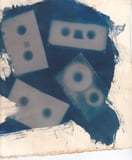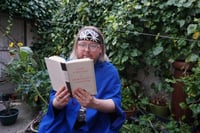blue forty: Bulbils
When the pandemic hit, it was like nothing any of us had experienced in our lifetimes. Looking back on those first few months of 2020 now, a year and a half on, it feels clear that we still haven’t really processed it.
The peculiar mix of banality and terror that descended during that first lockdown were a whole new type of feeling. On the one hand, banana bread, in the other – screaming internalised fear.
Families and work colleagues across WhatsApp groups swapped Netflix tips with fervour. In a lot of ways it helped to know there were other people busy plugging away at everything by trying to bung their hours up with as much cultural comfort food as possible.
The creative project I found most nourishing though wasn’t on a streaming service, it was beamed out of the living room and brains of two people in the North East of England who had decided to record and release a piece of music every day. It helped them, they reasoned, so maybe it could help others.
They ended up releasing 63 full albums of material. That’s pretty impressive by anyone’s standard. But when the musicians involved are Sally Pilkington and Richard Dawson of art-pop heroes Hen Ogledd, it means 63 albums of material with the potential for moments of serious beauty.
They gave this piece of sonic therapy the name Bulbils.
“It’s become a reason to share the kind of music we wouldn’t normally share, which feels like quite a personal thing,” Sally told The Quietus. “A lot of it’s quite rough and the kind of thing that’s quite unprocessed. It’s quite intimate in a way.”
“You know you see some people being really gung-ho,” Richard added, “and full of life and productive on their social media profiles? Hopefully this is that, but not as repulsive because it’s not that impressive.”
For me, the home-bakedness of this music could be what I love about it the most. It’s not rough in an unfinished or unpleasant way, instead it sounds cosy, unpretentious. It’s spontaneous and enthusiastic but also weirdly familiar and reassuring. You can curl up in this music and feel like Sally and Richard are there with you – Richard plonking away with simple, repeating bass lines over a motorik drum machine, Sally sketching out beautiful organ melodies that brim with optimism and delight.
I listened to Bulbils every night as I went to sleep during lockdown. It was a much-needed ritual that sucked the anxiety and stress out of my skull and instead piped in this warm, fuzzy loveliness that seemed to go on forever and is probably what the on-hold music in heaven sounds like.
Come on then, let’s get you to bed, it seemed to be saying. Enough for today.
Across the 63 releases, the pair cover a wide range of sounds with whatever instruments they could get their hands on. I approached them about doing a sort of Bulbils ‘best of,’ a release that would condense the creative highpoints of this daunting, baffling project down to a definitive single album, but over months of attempts at a tracklisting it became clear that this was virtually impossible to compute.
Instead, we present on one side of blue forty Sally and Richard’s own favourite track from the project, the 37-minute piece of armchair spacerock that is Journey of the Canada Goose. On the other side are the similarly-epic pieces that made me first fall in love with Bulbils – The Easter Bunny and Holy Smoke.
This cosmic living-room music is gentle, unhurried, and healing. Listening to these songs you felt that everything could still be OK. It’s real porridge-for-the-soul stuff. I think I might need it forever.
Praise for Bulbils:
“The music is for the most part hypnotic, lo-fi, beautiful and ambient - gently evolving, growing and shrinking from one album to the next.” – The Quietus
“Bulbils’ soothing, gentle, often wordless music certainly serves as a comfort/company to the listener.” – Narc Magazine
“Shonky ambient drone, weird dance, glittering electro-plop and malformed tudor synth shuffle.” – Supersonic
Praise for Hen Ogledd:
“…a joyous constellation of 'wonky' pop, free improvisation and sci-fi musing…” – The Guardian
“…not only a catalog of heartbreak and minutiae, but also a sci-fi odyssey warning of political isolationism and climate apocalypse…” – Pitchfork
“Free Humans is an ambitious, progressive, intelligent and experimental take on pop music, complete with jazz interludes, a nearly nine-minute penultimate number about the very real possibility of humanity's extinction, an ode to a nine-foot giant, and a song that channels the primal spirit of the Loch Ness Monster.” – The Quietus
Praise for Richard Dawson:
“Britain’s best, most humane songwriter.” – The Guardian
“Richard Dawson’s music is underpinned by a powerful sense of empathy – he’s rooting for us. And it’s hard not to conclude that 2020 is the record we need right now: a state-of-the-nation address for a nation in a bit of a state.” - Uncut
“This is a magnificent retention of quality and development from pop music’s Francis Bacon. It’s impossible not to find your own neurosis within the weave of these songs. It’s horrifying and gorgeous, and you’ll likely not hear a more singular or, indeed, better record this year. Is he a genius? Of sorts, probably. I can’t tell, and what does it matter?” – The Quietus





